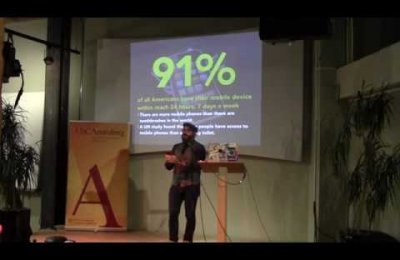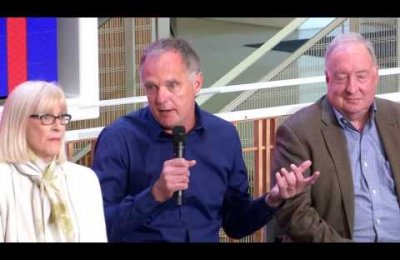At USC Annenberg, we don’t just cover the news, we make it. “Quoted: USC Annenberg in the News” gathers a selection of the week’s news stories featuring and written by the school's leaders, faculty, staff and others.
Who was missing from the Oscar nominations?
When the Oscar nominations were announced Thursday morning, Twitter was quick to respond with #OscarsSoWhite trending on the social platform. Of all 35 people nominated for acting, writing or directing awards, only Mexican film director Alejandro González Iñárritu is non-white. The Los Angeles Times cited research by professor Stacy Smith and the Media, Diversity, & Social Change Initiative. MDSCI has released several studies of minorities and women in film, concluding that "inclusivity and diversity are not valued by Hollywood decision makers."
Leave these western ways behind when dining in Asia
Mike Chinoy, a senior fellow at the USC US-China Institute, a program of USC Annenberg, was quoted by the BBC in a story about Asian cuisine. Chinoy offered advice on local traditions, such as while Chinese would pick fish fresh from the tank, "Thais, being serious Buddhists, would never want to suffer the bad karma of singling out any living being for death." “Rice liquor [poured out] under the table is a China survival skill,” he also noted.
Public Sales Of Google Glass To End Later This Month
USC Annenberg's resident Google Glass expert, professor Robert Hernandez, was quoted in an NPR story about Google's recent decision to pull the wearable tech from stores and transition into a new phase. This new phase has not been shared publicly beyond the fact that the Google Glass team will be moving "from concept to reality." Hernandez said he'd like to see Google sell Glass 2.0 at a loss if it means getting the device into more hands. "All these different critiques — it's distracting, it's immersive, you're not gonna pay attention to your life — those were comments and a narrative written by folks who really didn't interact with Glass, and if they did, it was only for 15 minutes."
It's now a little easier to get to Cuba, and you can buy cigars with credit cards
Professor Roberto Suro has traveled to Cuba many times with his students. In a interview on KPCC's Take Two, Suro talked about about what it means now that travel there is easing up. "The big change for ordinary folks is that you're not going to have to go through a lot of paperwork to prove that you're in one of the designated categories of people allowed to go to Cuba," Suro said. Another change is that there will be more regularly scheduled commercial flights to Cuba.
Arabs' Public Diplomacy Vacuum
In a new column for The World Post, Vice Dean Philip Seib wrote about the Charlie Hebdo murders and how the attack has “reinforced anti-Muslim and anti-Arab sentiment that, even when invisible, always simmers just beneath the surface of public opinion in much of the West.” Seib went on to discuss that these sentiments could be combated if Arab states were to stop ignoring public diplomacy.
Amazon joins Netflix in raising the TV stakes
The Los Angeles Times quoted director of USC Annenberg’s Center for the Digital Future, Jeffrey Cole, in a story about the television industry’s shift from traditional broadcast models towards streaming services like Netflix and Amazon.com. Amazon is fresh off winning its first Golden Globe for best television series for breakout comedy-drama “Transparent,” as well as a recent announcement that Woody Allen is set to write and direct a new series for the site. “Every pay-TV service has used the same playbook. They start by playing other people’s content and then move into creating original content,” Cole said. “Amazon had moved it into hyper speed.”
Following the tragic incidents surrounding French satirical publication Charlie Hebdo, Marty Kaplan, director of the Norman Lear Center, shared with The Jewish Journal his experience leading the nation’s oldest college humor magazine, The Harvard Lampoon. “Freedom of speech must include the freedom to outrage. If you have to fight fire with fire, you have to fight indecency with more indecency. Rudeness subverts oppression. Crudeness ventilates orthodoxy. Laughter strips the emperor naked. Satire is a check on power,” Kaplan said, defending Charlie Hebdo’s cartoons. Of college campuses today, Kaplan also said many of the stories he published in The Harvard Lampoon during the 1970s would now be cause for action from university disciplinary boards.
How ‘Harry Potter’ fans won a four-year fight against child slavery
The Washington Post quoted professor Henry Jenkins in a story about the fair trade activisim of The Harry Potter Alliance, an organization that he has studied. “The idea of civic imagination is, before we can change the world, we have to imagine what a better world would look like, we have to imagine ourselves as political agents,” Jenkins said. “I would say is what the Harry Potter Alliance does very well is foster the cultural imagination.”
The following is a selection of Quoted stories from the winter holiday.
Boston 2024: Why Bid to Host the Olympics?
Annenberg professor Alan Abrahamson was quoted in an NBC Chicago 5 story about the negative economic risks posed if Boston hosts the 2024 Olympic Games, which he disagrees with. “It’s totally worth it. You cannot put a price on dreams. That’s what the Olympics are all about it,” Abrahamson said. Boston recently won out against Los Angeles, San Francisco and Washington D.C. for the United State’s bid and will now go up against international options like Rome, Berlin and Hamsburg. Despite some public opposition that the games would be too costly to fund and recover from, Abrahamson said this is the best chance the United States has had for a Summer Olympics since Atlanta last hosted in 1996.
Chattanooga Touts Transformation Into Gig City
An Associated Press story featured in the New York Times discussed professor and Annenberg Innovation Lab Director Jonathan Taplin’s efforts in Chattanooga, Tenn., the first U.S. city with gigabit-per-second internet speeds. Now considered an emerging tech hub, Taplin says the entertainment industry is also taking notice of Chattanooga and its potential contributions to filmmaking. According to Taplin, directors like James Cameron want to create films at double the current ultra-high definition standard and Chattanooga’s fiber optic network “could handle that today.”
In a column for PBS Mediashift, professor Robert Hernandez gives advice on how to take risks in the newsroom and classroom without crossing the boundaries. Hernandez offers a five step plan to “disrupt the system,” hallmarking the need to be respectful, smart, communicate, promote and celebrate and build a new, digital culture over time. “The nut graph, if you are in a tl;dr state of mind, is don’t wait for the leadership to notice you, empower you or even take care of you. You and your friends and colleagues have to do that yourselves, and this is the era to do it,” Hernandez wrote.
New Appraisals of Violent Extremism
Vice Dean Philip Seib commented on the fight against violent extremist organizations in the Middle East in a column for The World Post, which he says will require policy implementation from the State Department and other U.S. agencies. Seib praises a speech by Rashad Hussain, U.S. Special Envoy to the Organization of Islamic Cooperation, that stresses the need for partnerships among governments and NGOs encouraging young Muslims to enter professional or humanitarian work and a report from Al Jazeera warning against the dangers of the Islamic militant group Daesh. But Seib says it will take more than “reaching these young men and women” to effect permanent reform. “As this process continues, lessons should be learned and remembered. Once Daesh is defeated—and it eventually will be— other violint extremist organizations will arise. The struggle against them must continue until the political and social environment that has fostered their growth is fundamentally changed,” Seib wrote.
UC Davis newspaper struggles to resume print publication
While UC Davis’ student newspaper The California Aggie continues to search for a publisher that will fund the revival of its print edition, professor Marc Cooper told The Sacramento Bee he wasn’t surprised at the paper’s shortcomings. “Most newspapers are struggling to meet the bottom line with the properties they have. Newspapers are cutting back, not expanding,” Cooper said. Now $60,000 in debt, Cooper thinks The California Aggie should instead focus on creating a more accessible website and mobile app for its digitally savvy college student demographic.
Sikh Americans tell their story with first-ever Rose Parade float
Professor Diane Winston questioned the Sikh community’s decision to use a float in the Rose Parade as a messaging tool. In the KPCC story, Winston noted that it’s very low-tech and old-fashioned approach. "Will everybody wake up the next day and understand that turbaned men are Sikhs and not Muslims? I doubt it." Winston said. "These things happen over time. It’s not like a flash-bang."
Internet expert Douglas Thomas on the hacking of Sony Pictures
Professor Douglas Thomas shared his knowledge on internet security and cybercrime in regards to the North Korean linked Sony Hack in a column for The Los Angeles Times, which he says is “extremely difficult” to punish by law. “How do you talk about trespass — for example — in a virtual world? Trespass is predicated on the idea that your body is someplace it shouldn't be. But when you're on your computer in your mom's basement, that's no longer true. You're looking at things you shouldn't be looking at,” Thomas said. “It's not a crime to walk up to someone's car and look in the window and admire their stereo. It's only a crime when you open the door and pull that stereo out.” Thomas is weary of any law that will be enacted as a result of the attack, though.
Pop Politics: John Lewis Says Selma is ‘Long Overdue’
Interviewed on Sirius XM’s “PopPolitics” and featured on Variety, professor Mary Murphy said as a result of the cyberattack on Sony, moviegoers will see a change in content on the silver screen. “The short term fallout will be people will maybe stop making movies which have controversial characters or plot lines about countries that we have a great fear of,” Murphy said. “In terms of Hollywood, I think it really is going to make people pause creatively. I don’t like that and people are angry that they say the hackers won. But Hollywood also has to figure out a way to really have a better security system for their internet because this cannot happen again.” Like many of those in the entertainment industry, Murphy also foresees big changes to the executive suite at Sony and acknowledges a mistake that might have cost The Interview’s wide release.








